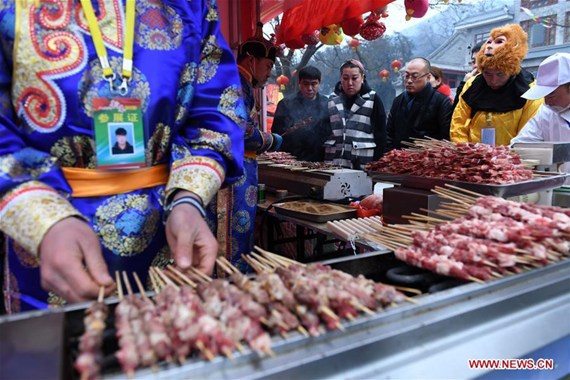
A vendor sells lamb shashlik at a temple fair of the Badachu Park in Beijing, capital of China, Jan. 28, 2017. (Xinhua/Li Jundong)
(ECNS) -- Some temple fairs in Beijing tried to highlight exotic tastes to attract visitors during the week-long Spring Festival holiday, yet they might have unfortunately spoiled appetites instead, according to Beijing Youth Daily.
Traditional temple fairs usually have lines of booths demonstrating and selling traditional arts and crafts, especially numerous kinds of local snacks and other dishes.
Both Shijingshan Amusement Park and Chaoyang Park have vigorously advocated an image of international culture in their temple fairs.
Booths in the Shijingshan park touted beef from the U.S., fried chicken from the U.K., French steak with wine, Japanese snacks, Malaysian hot drinks and Brazilian barbecue. However, except for several Indians selling fried flatbread Roti Prata, most booth operators were Chinese people.
The vendors were either unsure of the authenticity of ingredients to make exotic food or declined to answer the question.
A vendor selling Australian barbecue didn't give any response when a visitor asked whether their meat was imported from Australia. Another vendor selling British food said candidly that it's just an exotic name. Visitors seemed to care less about sources and still bought the snacks in festive spirit.
The temple fair saw many booths accept mobile payments through simple scanning of a QR code, but the lack of free WiFi and sometimes low Internet access caused difficulties for tourists without cash in pocket.
The newspaper also found some booths didn’t clearly show prices, as required, or failed to clear up piles of used BBQ sticks in Chaoyang Temple Fair, actually called Chaoyang International Carnival.


















































